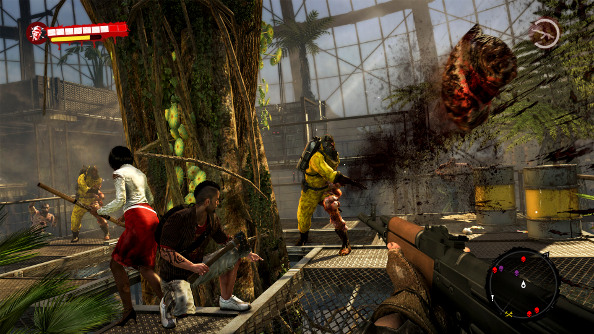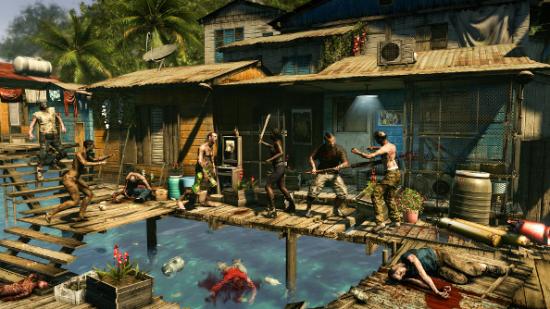I knew my hands-on with Dead Island: Riptide at PAX was in trouble the moments a pair of nine-year-olds lined up at the stations next to me, with a single ineffectual parent at the other end of the row. They each went for the same controller, fought briefly over it, then settled down and put on their headphones. Suddenly, mine were filled with exactly the kind of nonstop falsetto cursing and shit-talking that I spend most of my multiplayer life trying to avoid.
On the plus side, it’s not often you get to preview a game under the dreariest real-world conditions imaginable. In some ways it’s a good thing: just as bad games can help put good ones in perspective, interacting with bad players challenged what I thought I knew about the audience for games like Riptide. You see, Riptide isn’t a game for children, but a pair of little kids loved it all the same. And that’s a problem.
By the time I loaded in, my teammates were already gone, sprinting through the undergrowth while slashing their knives wildly. “Hurry up, gaywad.” Kids still call each other gaywad?
“Fuck you, Eddie,” piped Gaywad.
“Boys,” said Irresponsible Father, as if he were about to start parenting at any moment.
The sound was mixed so low that every time the kids talked, which was always, it wiped out game audio and quest dialogue. Not that it mattered: walking toward the nearest objective marker on the HUD and killing everything nearby proved a sound recipe for success. At one point the kids swiftly tossed up a barricade to hold a friendly outpost and we spent a few minutes chopping at zombies as they tried to break through. Then we ran somewhere else to do something about a bridge. And some zombies. Or something.
It’s alienating, playing games with very young kids like these. In some ways it’s watching absolutely pure play, a mechanical exercise that operates completely independently of atmosphere, story, mission design, or role-play. Every time Riptide attempted to be about something, anything, beyond beating the ever-living shit out of brain-dead shamblers, Eddie and Gaywad stoutly ignored it. They were here to do one thing only: smash everything that moved. Irresponsible Father trailed along like a slightly deflated balloon.
How much game design does an audience like this render irrelevant? You always hear developers exchanging shocking statistics about who completes their games, how few players explore more than a handful of gameplay options, but it’s still breathtaking to see a couple preadolescents stripping a game bare like a swarm of locusts. Every challenge is met head-on with a frenzy of chopping and bored cursing.
For the most part, Dead Island: Riptide seems like the kind of game where knowing how to chop and whack zombies will stand you in good stead. But our merry band ran into problems when teamwork and restraint were called for. At one point, we all got hold of some flare guns and in no time at all both the children had set each other on fire by using them as point-blank melee weapons. Then we were all supposed to pile in a car and drive down the coast to another mission location, through roads choked with zombies.
These long passages are an important part of Riptide, giving it a chance to show off its scale as players drive miles through the jungle (or even sail along the coast), past survivors’ outposts and infested locations. Zombies aren’t very strong against cars and boats, so it’s usually a good idea to grab a vehicle when the opportunity presents itself.

I could see, for a moment, what it would be like to play Riptide with a real team or even in comforting solitude. How there could be a cool dynamic as players foraged for equipment and supplies in the world, rearmed at survivors’ camps, and then ventured forth once again into the wild. It reminded me a bit of one of my favorite games from last year, ZombiU (for which I almost bought a WiiU), with a nice focus on skillful encounter management and melee timing.
Then one of the kids peeled away in the car before our two companions could join us. “Hahahahaha, have a nice walk you guys!”
“I don’t even care, assface,” trilled the other. “I was just gonna walk anyway. I like killing these guys.”
“C’mon guys. Let’s try and stick together,” sighed Ineffectual Dad.
From the rear seats, I watched the verdant jungle landscape whir past, punctuated by the wet thunk of zombies against our front bumper. Then my driver turned the car around to go get our companions, who had already grabbed a vehicle of their own. To my complete lack of surprise, we ran into each other head-on. The boys immediately resorted to trying to shove each other’s cars off the road and down in the valley below. Mercifully, that’s when our session ended. The kids trundled off, laughing and shoving at each other while the next group of players filed in.
I was nonplussed. It was frustrating to see Riptide at a flat-out run, punctuated by disorienting brawls. I also hate to see a parent enabling abominable behavior and language, along with some egregiously underage gaming.
Rated “mature”
But I didn’t know until GDC what was festering the most about the experience. I listened to Mike Capps and freelance games writer Daniel Greenberg complain about the scapegoating of the games industry, and the fact that politicians ignore how successfully the industry self-regulates with a strong rating system.
But my time playing Riptide with a couple children underlined more than anything just how self-serving this argument really is. On the one hand, these are games intended for an older, more mature audience. But on the other hand, who are we kidding? They are for exactly the kind of immature boys I played with, regardless their age. How many times is a design pitched at an impatient, impulsive action gamer who isn’t too big on listening or planning? It’s not just that a lot of games are full of mindless pretend violence, but that everything but the mindless violence is disposable.
I came away from that session suspecting that those kids were interfering with more than a hands-on demo on a convention show floor. Sometimes it feels like I’m constantly running up against games that are quietly pandering to children with a wink and a nod.
We say these things are meant for adults but you can only play so many murderous open-world minigame collections before you start to suspect someone is either lying to themselves or to the public. I don’t think it’s the mature games audience that’s clamoring for more homicidal Short Attention Span Theater. Yet it seems like that’s becoming the standard template for a major game. Not too hard, certainly not complicated, with just enough cruelty and cursing to make it edgy, and nothing approaching a worldview.
I don’t mean to pick on Riptide. It looked fine and I look forward to playing it under less trying circumstances. As an exercise in cooperative survival, it seems fun. But I started wondering, as I took off my headphones and headed back to the relative quiet of the PAX show floor, whether developers shouldn’t be more concerned about their underage audience. About the fact that they have one, and the fact that so many of their games do nothing to discourage them.
I remember being very young and very much in love with Doom. I knew it wasn’t really something I was supposed to be playing, though I had my father’s permission, but the shooting, speed, and dread were all irresistible to me. But Ian Bogost said something else at that panel on the scapegoating of games in the public discourse. He mentioned that there is a longstanding assumption that as the gaming audience grows up, as the people making games grow older, games will naturally grow up as well. But that hasn’t happened. It shows no signs of doing so. The audience is older, the industry is older, but many of the games are still both playable and fascinating to children. Maybe the industry needs to start thinking about what kind of games won’t engage little boys, and make more of those.
